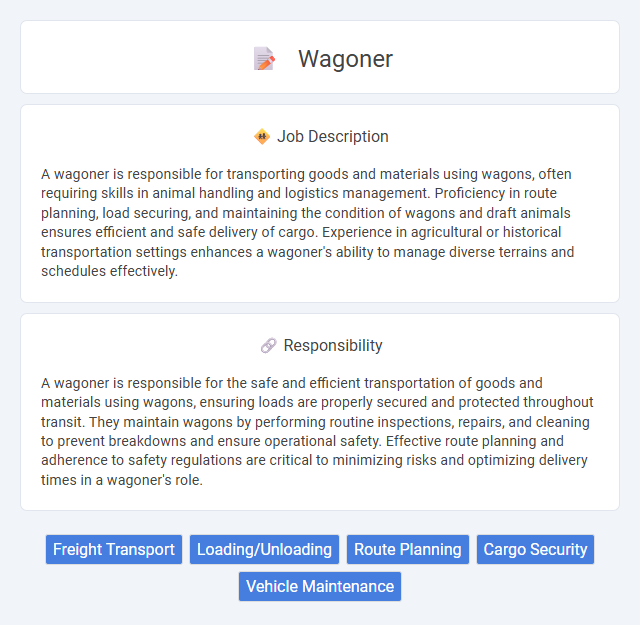
A wagoner is responsible for transporting goods and materials using wagons, often requiring skills in animal handling and logistics management. Proficiency in route planning, load securing, and maintaining the condition of wagons and draft animals ensures efficient and safe delivery of cargo. Experience in agricultural or historical transportation settings enhances a wagoner's ability to manage diverse terrains and schedules effectively.
Individuals with good physical stamina and the ability to handle repetitive lifting are more likely to be well-suited for a wagoner job, as the role often involves manual labor and extended periods of standing or walking. Those who may struggle with physical endurance or have certain health conditions could find the demands of this job challenging. It is probable that applicants possessing strong coordination and attention to safety protocols will perform better and adapt more effectively to the tasks required.
Qualification
A Wagoner typically requires physical strength, stamina, and the ability to handle heavy equipment safely. Essential qualifications include previous experience in freight handling or transportation support roles, proficiency in operating loading machinery, and strong teamwork skills. Certifications such as forklift operation or safety training improve employability in logistics and supply chain sectors.
Responsibility
A wagoner is responsible for the safe and efficient transportation of goods and materials using wagons, ensuring loads are properly secured and protected throughout transit. They maintain wagons by performing routine inspections, repairs, and cleaning to prevent breakdowns and ensure operational safety. Effective route planning and adherence to safety regulations are critical to minimizing risks and optimizing delivery times in a wagoner's role.
Benefit
Working as a wagoner may likely provide steady income and opportunities for overtime pay, enhancing overall earning potential. Benefits often include health insurance, retirement plans, and paid time off, contributing to financial security and work-life balance. Employees might also enjoy skill development and career advancement prospects within the transportation or logistics industry.
Challenge
A wagoner job likely involves significant physical and mental challenges due to the demanding nature of transporting goods or materials over various terrains. The role probably requires strong problem-solving skills to navigate unexpected obstacles and ensure timely delivery. High endurance and adaptability are expected to manage long hours and changing environmental conditions effectively.
Career Advancement
Wagoner jobs offer opportunities for career advancement through gaining experience in logistics, vehicle operations, and inventory management, enabling progression to supervisory or logistics coordinator roles. Mastery of vehicle maintenance, safety protocols, and route optimization can lead to increased responsibilities and higher pay within transportation and supply chain sectors. Continuous skill development and certifications in warehouse management or fleet operations significantly enhance promotion prospects in this field.
Key Terms
Freight Transport
Wagoners play a crucial role in freight transport by loading, unloading, and securing cargo in railcars and trucks to ensure safe and efficient delivery. Their responsibilities include inspecting freight for damage, maintaining accurate shipment records, and coordinating with logistics teams to optimize transport schedules. Skilled wagoners contribute to reducing delays and preserving the integrity of goods throughout the supply chain.
Loading/Unloading
Wagoners specialize in efficiently loading and unloading goods, ensuring the secure placement of cargo to prevent damage during transportation. They utilize equipment such as forklifts and pallet jacks to handle heavy materials swiftly while adhering to safety protocols. Precision and organizational skills are essential for managing inventory and maintaining workflow in logistics and supply chain operations.
Route Planning
Wagoner job responsibilities include precise route planning to ensure timely and efficient delivery of goods. Effective route planning minimizes fuel consumption and travel time by analyzing traffic patterns, road conditions, and delivery schedules. Utilizing GPS technology and logistics software enhances route optimization, improving overall operational efficiency and customer satisfaction.
Cargo Security
Wagoners play a critical role in ensuring cargo security by meticulously monitoring the loading, transport, and unloading processes to prevent theft, damage, or loss. Their responsibilities include securing cargo with appropriate restraints, inspecting seals, and maintaining detailed documentation for every shipment. Effective cargo security by wagoners reduces logistical risks and enhances supply chain integrity.
Vehicle Maintenance
Wagoners are responsible for the maintenance and repair of military and commercial vehicles, ensuring operational readiness and safety. Their duties include inspecting engines, brakes, electrical systems, and tires, performing preventive maintenance, and troubleshooting mechanical issues. Effective vehicle maintenance by wagoners enhances mission efficiency and reduces downtime in transportation logistics.
 kuljobs.com
kuljobs.com